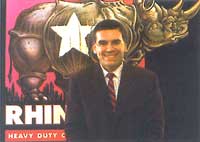
Erasing The Ink Cartel
By Christian Sylt

IT companies bank on the healthy profit margins from printer cartridges to boost
their bottom lines. However an EU ruling at the end of last year makes this cash
cow much harder to milk. Without the huge overheads of a company like HP and
unprofitable divisions to support, Rhinotek can tolerate a lower profit margin
than its colossal competitors...
AS TECHNOLOGY spending has tumbled, the
IT Industry has suffered the most severe decline in its history. But the biggest
IT companies have had a little-known safety net to buoy their bottom line.
Surprisingly, the majors have a rainy-day cash cow in the form of humble printer
cartridges. And a plethora of patents and tough-to-copy chips has prevented
third party remanufactures (so-called because their products combine new and
used components) from manufacturing cheaper cartridges and eating into the tech
titan’s market share. This cozy cartel hasn’t escaped the wrath of the European
Parliament, however.
In December last year, the parliament voted unanimously
to ban printer companies from forcing consumers to buy manufacturers’ own-brand
refills. This provision was included in a last minute amendment to the WEEE
directive, a European Union bill requiring manufacturers of electronic goods to
pay for recycling them. The IT companies can appeal the bill, which comes into
effect in 2006, but the move couldn’t come at a worse time for
them.
According to consulting company CAP, HP dominates the 11 billion West
European printer ink industry with a 44 per cent market share - During the past
three ears HP’s market share has fallen by 75 percent and whilst ink and toner
cartridges bring in 10 billion globally each year - 15 per cent of the company’s
revenue - massive mark-ups on these products provide even bigger profits. The
printer and imaging unit accounts for over 40 per cent of HP’s profits, mostly
coming from the sale of printer ink.
As the IT industry has been badly hurt
over the last five years, printer prices have tumbled. However, the cost of
cartridges has edged up as companies have capitalized on the fact that customers
can’t do without ink once they’ve bought a printer. Whereas colour printers now
cost around $100, replacement cartridges typically sell for up to half this
price.
Re-manufacturers in the US have banded together in recent years to
file law suits alleging that HP and other printer makers have violated antitrust
laws by using technological nuances to thwart discount competition. The handful
of suits, filed mostly in state courts, are either pending or have been settled
confidentially, both sides say. HP stresses that no suit has been resolved with
a finding that it violated any antitrust law and the company claims it is ‘in
full compliance with antitrust and competition laws’.
Nonetheless, protecting
the lucrative cartridges from discount knock-offs is still a top priority for HP
- its 4100 laser printer, launched in March 2001, is HP’s biggest income
generator. The machine costs $1,850 but its cartridge sells for a staggering
$120. The cartridge was also the first to include a so called smart chip, which
triggers messages to users about toner level. The chip also happened to have
another benefit for HP in that it made the cartridge difficult to clone. But
even this couldn’t stop the remanufactures.
By tapping a network of moles
from sources such as retail dealers and outside contractors working in IT
companies, remanufacturers are armed with advance information about pending
products. In 1999, unknown to HP, news that the smart chip equipped 4100
cartridge was in development leaked from the company to Rhinotek Computer
Products, a small remanufacturer in California.
Rhinotek releases a new line
of cartridges for HP printers at the rate of one a month and it develops a new
cartridge from scratch in just three to four months. Of the company’s 74
cartridge products, 60 are designed to work with HP printers and, crucially, its
best-seller is the cartridge which fits into the HP 4000 - the printer replaced
by the 4100.
In August 2002, to the chagrin of the printer powerhouses.
Rhinotek released its cartridge for the 4100. Without the huge overheads of a
company like HP and unprofitable divisions to support, Rhinotek can tolerate a
lower profit margin than its colossal competitors and by using less expensive
components, Rhinotek sells its 4100 cartridge for about $90, undercutting HP by
25 per cent - and shattering its monopoly.
The ruling from the European
Parliament should give the remanufacturers the level playing field they want in
Europe, hut despite this, they face another ongoing battle. Rhinotek and other
printer manufacturers must convince the public that their products are in no way
interior to the printer manufacturers’ own brands and, ironically, the
discrepancy in price isn’t always an advantage as some customers still confuse
cheaper cost with lower quality. Even so, although it may he tough to change
customer preconceptions, the writing is on the wall for the printer companies.